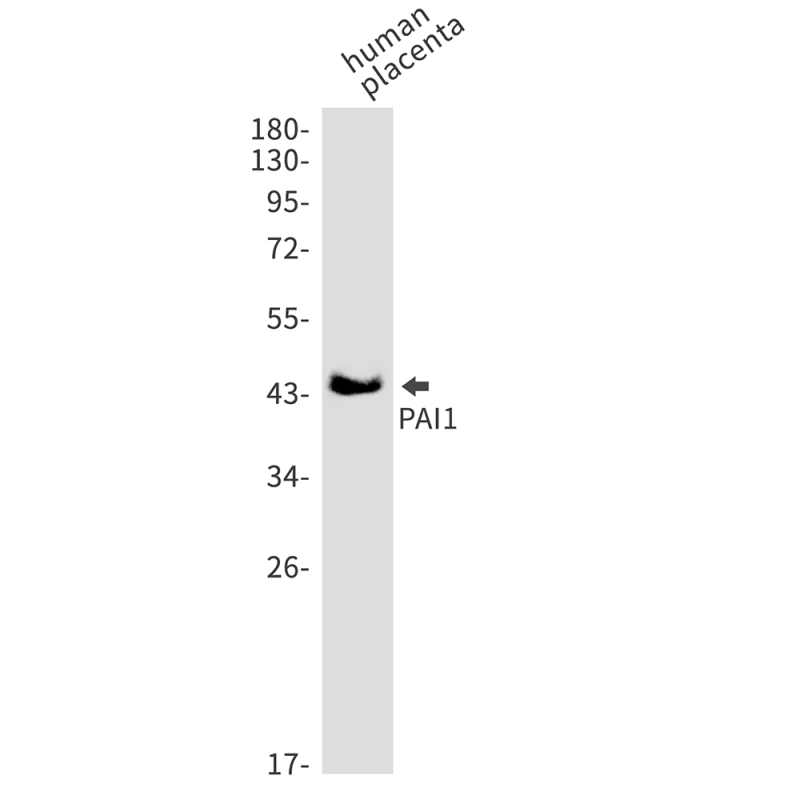
| WB | 1/500-1/1000 | Human,Mouse,Rat |
| IF | 1/20 | Human,Mouse,Rat |
| IHC | 咨询技术 | Human,Mouse,Rat |
| ICC | 1/50-1/200 | Human,Mouse,Rat |
| FCM | 咨询技术 | Human,Mouse,Rat |
| Elisa | 咨询技术 | Human,Mouse,Rat |
| Aliases | SERPINE1; PAI1; PLANH1; Plasminogen activator inhibitor 1; PAI; PAI-1; Endothelial plasminogen activator inhibitor; Serpin E1 |
| Entrez GeneID | 5054 |
| WB Predicted band size | Calculated MW: 45 kDa; Observed MW: 45 kDa |
| Host/Isotype | Rabbit IgG |
| Antibody Type | Primary antibody |
| Storage | Store at 4°C short term. Aliquot and store at -20°C long term. Avoid freeze/thaw cycles. |
| Species Reactivity | Human,Mouse,Rat |
| Immunogen | Recombinant protein of human PAI1 |
| Formulation | Purified antibody in TBS with 0.05% sodium azide,0.05%BSA and 50% glycerol. |
+ +
以下是关于PAI-1抗体的3篇代表性文献,涵盖不同研究领域:
1. **文献名称**:*"Targeting PAI-1 in Idiopathic Pulmonary Fibrosis"*
**作者**:Sisson, T.H. 等 (2003)
**摘要**:研究证明,使用PAI-1中和抗体可显著减少纤溶抑制,改善小鼠模型中的肺纤维化病理特征,提示PAI-1抗体在抗纤维化治疗中的潜力。
2. **文献名称**:*"Plasminogen activator inhibitor-1 (PAI-1) promotes tumor cell invasion in breast cancer"*
**作者**:Bajou, K. 等 (1998)
**摘要**:通过抗PAI-1抗体阻断其功能,发现可抑制肿瘤细胞外基质降解和血管生成,降低乳腺癌小鼠模型的转移率,揭示PAI-1在肿瘤微环境中的关键作用。
3. **文献名称**:*"Neutralization of PAI-1 improves insulin sensitivity in metabolic syndrome"*
**作者**:Crandall, J.P. 等 (2006)
**摘要**:在肥胖小鼠模型中,PAI-1抗体治疗减少了脂肪组织炎症并增强胰岛素信号通路,表明靶向PAI-1可能改善代谢综合征相关病理。
4. **文献名称**:*"PAI-1 inhibition enhances thrombolysis in a murine thrombosis model"*
**作者**:Vaughan, D.E. 等 (2000)
**摘要**:实验显示,PAI-1抗体联合纤溶药物(如tPA)可加速血栓溶解,为抗血栓治疗提供了新策略。
以上研究展示了PAI-1抗体在纤维化、肿瘤、代谢疾病及血栓领域的治疗潜力。
**Background of PAI1 Antibody**
Plasminogen activator inhibitor-1 (PAI-1), encoded by the *SERPINE1* gene, is a key member of the serine protease inhibitor (serpin) family. It primarily inhibits tissue-type plasminogen activator (tPA) and urokinase-type plasminogen activator (uPA), thereby regulating fibrinolysis, extracellular matrix remodeling, and cellular migration. Elevated PAI-1 levels are associated with thrombotic disorders, fibrosis, metabolic syndrome, and cancer progression, making it a biomarker and therapeutic target.
PAI1 antibodies are immunological tools designed to detect and quantify PAI-1 in biological samples. These antibodies are critical for studying PAI-1's expression, localization, and function in vitro and in vivo. They are widely used in techniques like Western blotting, immunohistochemistry (IHC), enzyme-linked immunosorbent assay (ELISA), and immunofluorescence. Monoclonal antibodies offer high specificity, while polyclonal antibodies may detect multiple epitopes, enhancing sensitivity.
Research applications include investigating PAI-1's role in pathological processes, such as impaired fibrinolysis in cardiovascular diseases or its pro-fibrotic effects in organ fibrosis. Clinically, PAI1 antibodies aid in diagnosing conditions linked to PAI-1 dysregulation and in developing anti-PAI-1 therapies. However, challenges remain, including cross-reactivity with other serpins or variability in isoforms across species, necessitating rigorous validation for experimental accuracy.
×